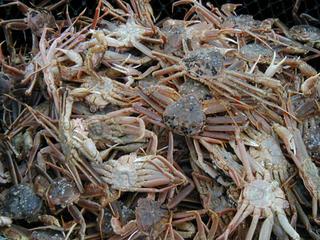Five Boats Busted With Female Crab

Monday, June 04 2012
The crab fleet is suffering from a bit of female trouble.
In the past week, five fishing vessels have received citations for possessing female snow crab. That’s an unusual number of violations for the 40-boat fleet, says Sgt. Robin Morrissett with the Alaska Wildlife Troopers. Three citations were issued on Tuesday and two more were given on Thursday. Morrissett adds that the take of female crab can lead to trouble for the fishery.
“Because they’re females, they’ve got a lot of eggs on them,” says Morrissett. “Those are the breeders and those have to go back to the bottom.”
According to Morrissett, the F/Vs Bulldog, Western Mariner, Aleutian Mariner, Bering Star, and Kona Kai all received write-ups. If convicted, the fishermen cited could face a minimum fine of $3,000, with a maximum of $10,000 for repeat offenders.
Morrissett recommends that fishermen show extra caution while sorting out the males from the females. If the females are identified shortly after being caught, they can be thrown back into the water with a high chance of survival. But if females are brought back to shore, they’re considered dead loss. Possession of even just one female is a criminal offense.
But sloppy sorting may just be one reason for the large number of female crab takes. There could be a biological component, too.
“We are getting into the time of year that they probably are starting to mate,” says Heather Fitch, the area management biologist with the Alaska Department of Fish and Game’s Unalaska office. “It could be that that’s what’s occurring. Then, you would see more females with the males. If you get a lot of females coming up with the males it is very difficult to sort through, because the females are actually really little compared to the males.”
ADFG will continue to monitor the situation through the June 15 closure date. While the Department has the authority to shut down the season if female crab possession threatens to damage the fishery, ADFG is currently recommending that fishermen use extra case when sorting their product and that they try to avoid fishing grounds where large numbers of females are being caught.



